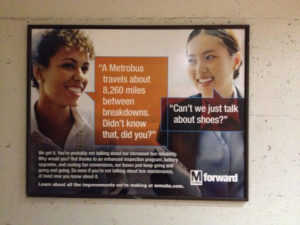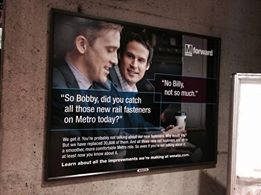The annals of stupid are long and deep, but some of the worst offenses, I think we must agree, occur in the course of trying to sell something—particularly when that something is very transparently a load of bull.
Keep in mind I grew up on Virginia Slims commercials, back in the dark ages of analog TV, when Madison Avenue decided to grab hold of (that is, exploit) the nascent women’s movement of the late 70s and turn it into a pitch for cancer in a stick. I for one was thrilled to learn that my sex had earned the right to choke to death right along with the guys. Enjoli perfume wasn’t far behind when it came to offensive advertising. If you don’t know what that was—consider yourself fortunate to have been born after 1980.
But apparently the Washington Metropolitan Area Transit Authority–which we folks in D.C. fondly refer to as “Metro” or, in some quarters, “the ride from hell”– didn’t get the memo. So they don’t seem to realize that we women have come a long way, baby, and therefore have other things on our minds besides a new pair of shoes or frying up the bacon in the pan (And yes, after 10 hours on the job, I will let you forget you’re a man—unless you plan to cook dinner, honey. But I digress).

Check this out—it’s the latest in Metro’s series of ads aimed at informing us of the fantastic progress being made in improving the transit system, which is notorious for performance issues and equipment failures—not to mention fatal collisions. The foot-crushing capacity of Metro’s ineptly designed escalators was once the worst danger facing an inattentive commuter, but since the 2009 wreck on the Red Line, things have taken an ugly turn. As it has been well-reported, Metro’s problems stem from its long-standing policy to save money by putting off fixing things until they fell apart. Needless to say this short-sighted approach to maintenance has caught up with Metro, and now that the agency has embarked on a multi-year effort to finally set it right, the agency has also embarked on an ad campaign (god knows how much that cost) to let us know just how great things are going.
The ad in question has caused quite a stir for its blatant sexism ( DCist here, and Buzzfeed, here, had a few choice things to say). Ho hum who wants to hear about Metro’s improved performance when we can talk about shoes? After all, we are really only interested in shopping, aren’t we, girls? Shopping and fingernails, I guess. Woman as bimbo is a tired old trope, and the fact that the two women in question are women of color only adds to the insult. But this is garden variety sexism—the advancement of stereotype in the guise of humor.
For my money, the offensiveness of the ad goes even deeper—because it reflects a peculiar kind of narcissism unbecoming to a public transit agency whose mission is, well, to serve the public. Considering that this poster is supposed to impress the cynical commuter, I don’t think Metro has much to brag about. I mean, I don’t know, maybe going 8,200 miles between breakdowns is good for a bus, but really who gives a sh*t? I’ve driven my VW 50,000 miles without it ever breaking down—so I kind of agree with the woman on the right. That doesn’t sound like much to talk about, so why don’t we talk about shoes?
It gets worse, though, when you look at another ad in the same series—two dudes chatting each other up about—I am not lying—rail fasteners. Because Metro has replaced 30,000 of them and we all need to know that and be very very impressed! But, sorry, Metro, I am not particularly impressed with the number of rail fasteners you’ve replaced. You are, in fact, operating a railroad, so it seems to me that putting down rails and rail fasteners ought to be something you do pretty routinely. Yes, 30,000 is a big number but that only speaks to the fact that you spent a lot of years not doing the work that you should have been doing all along, so no, I am not especially impressed.

I will tell you what will impress me:
I will be impressed when I notice that my trip is actually smoother and faster, and I get to work on time. When breakdowns and delays become a rare occurrence—instead of an almost daily routine—then I will be impressed, thank you.
All of this points to the essential self-absorption of the campaign itself, because these figures are internal metrics–the kinds of numbers that excite bean-counters and engineers, bragging rights for the system’s managers to take to the board of directors. For somebody waiting in the rain 40 minutes for the next bus, or jammed into a Red Line car that is stalled on the tracks because of a signal problem, these kinds of details don’t add up to jack. And there is no reason why they should.
The commuter is the customer—on the receiving end of the service, which is to get from place to place on schedule. A railroad bragging about how many rail fasteners it put down is like Dell trying to sell computers on the basis of how many screws it uses to attach the motherboard. Glad it’s in there, guys, but all I care about is when I hit that power button the thing fires up and loads my applications.
When it comes to Metro there are only two statistics that matter to me: 1. Exactly how many minutes late are you going to make me today? and 2. What is the probability that you don’t kill me before I get there?
Anything else is just noise.
UPDATE: Looks like Metro is not just sexist but racist too.
